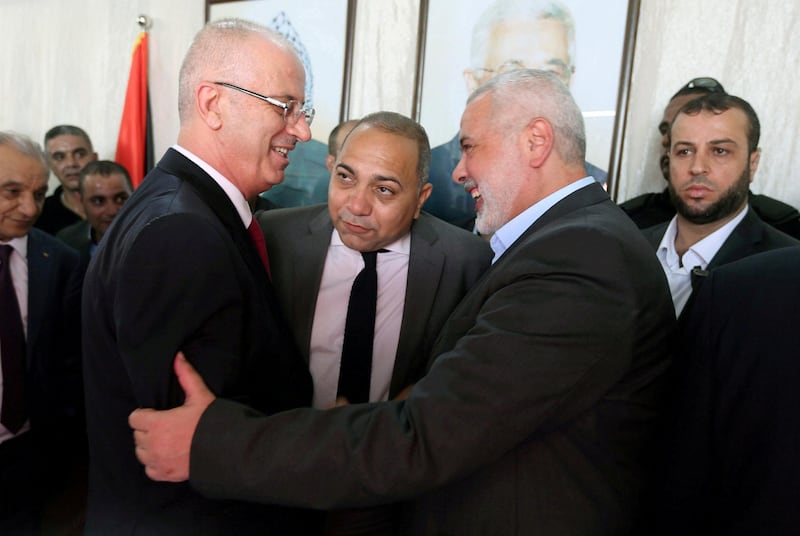Unity talks between rival Palestinian factions Fatah and Hamas in Cairo began on an optimistic note on Tuesday, with a top Hamas delegate saying he was "full of hope" for a road map to reconciliation.
Fatah, which controls the West Bank, lost control of Gaza to Hamas in fighting in 2007. But last month Hamas agreed to cede powers in Gaza to president Mahmoud Abbas' Fatah-led government, known as the Palestinian Authority, in a deal mediated by Egypt.
Cairo subsequently set up this week's three-day talks on the implementation of further steps towards unity.
"We meet in Cairo full of hope to draw and lay down a road map entitled a national reconciliation," senior Hamas delegate Izzat Reshiq said on Twitter.
"Unity and national reconciliation among all our Palestinian people is our strategic option to move forwards."
Azzam Ahmad, one of the leaders of the Fatah delegation, said negotiations would also cover the running of government ministries in Gaza. Also heading the Fatah contingent is Palestinian intelligence chief Majed Faraj, a close ally of Mr Abbas. Heading the Hamas delegation is Saleh Arouri, the group's deputy leader.
A third issue on the table would be the fate of the 40,000 to 50,000 employees that Hamas has hired since 2007.
Security will be the main focus of the talks, including the possible deployment of 3,000 Fatah security officers who would join a Gaza police force over the course of a year, restoring much of Mr Abbas' influence in Gaza and further loosening Hamas' grip.
________________
Read more:
[ Palestinian Authority cabinet meets in Gaza for first time in three years ]
[ Egypt's Sisi urges Palestinian unity a day after meeting with Netanyahu ]
Editorial: Hamas will have to disarm for 'historic' meetings to go anywhere
[ West Bank votes in election which underlines Palestinian split ]
________________
Mr Ahmad said Rafah, Gaza's only border crossing with Egypt and once the main gateway to the world for its 2 million people, should be run by Mr Abbas's presidential guards with supervision from the European Union border agency instead of the currently deployed Hamas-linked employees.
He said the government would work to complete arrangements in a week or two for the Erez and Kerem Shalom crossings with Israel.
Israeli prime minister Benjamin Netanyahu has warned the Palestinians against "bogus reconciliations", reiterating Israel's demand for the disbandment of Hamas's military faction. Hamas has said its arms are not up for discussion.
The cabinet of the West Bank-based Palestinian Authority also said on Tuesday it hoped the Cairo talks would succeed.
"The cabinet hopes the national dialogue session in Cairo will succeed in achieving reconciliation and reunite the homeland. It expresses readiness to assume full duties in Gaza Strip soon the factions clinched an agreement."
The handover of administrative powers was a major reversal for Hamas, partially prompted by the group's fears of potential financial and political isolation after its main donor, Qatar, suffered a major diplomatic crisis with the UAE, Saudi Arabia, Bahrain and Egypt.
Both sides hope that the proposed deployment of security personnel from the Palestinian Authority to Gaza's borders will encourage Egypt and Israel to ease restrictions at border crossings, and help Gaza revive its economy.
Hamas and Fatah will also discuss a date for presidential and legislative elections and reforms of the Fatah-dominated Palestine Liberation Organisation, which is in charge of long-stalled peace efforts with Israel.
The last Palestinian legislative election was in 2006 when Hamas won a surprise victory. This sparked the political rupture between Hamas and Fatah that eventually led to their short civil war in Gaza in 2007.
Egypt has helped mediate several attempts to reconcile the two movements and form a power-sharing unity government in Gaza and the West Bank. Hamas and Fatah agreed in 2014 to form a national reconciliation government, but despite that deal, Hamas's shadow government continued to rule the Gaza Strip.
The talks in Cairo came just hours after the governor of Egypt's North Sinai province said the Egyptian military had bulldozed at least 140 homes and more than 80 hectares along the Gaza Strip border, expanding a buffer zone in an effort to cut off the flow of weapons and militants.
Major General Abdel-Fatah Harhour, said late on Monday that the military began a new phase in clearing the zone, which is 1,500 metres wide and 10 kilometres long.
Egypt has struggled to combat an ISIL-led insurgency in the northern Sinai since 2014, and has built the buffer zone to prevent the militants from using a vast tunnel network under the Gaza border, which was created to evade a decade-old Israeli and Egyptian blockade on the Palestinian territory.
Hamas has also worked to secure the border in recent months as it tries to improve ties with Cairo. The group has cracked down on more extreme rivals in the territory, including supporters of ISIL.
Maj Gen Harhour said the government has promised to compensate those who lost their homes and farms. But a tribal leader, Sheikh Issa Karafin, said some evacuees hadn't received the money yet.





